I have 20 projects in my .SLN file. I am running my unit tests through the Test Explorer and generating the code coverage. Only eight of the projects show up in the coverage (see screenshots). I am using a runsettings file in which I have commented out the contents of all of the <exclude> tags, like so:
<PublicKeyTokens>
<!-- Exclude Visual Studio extensions: -->
<Exclude>
<!--
<PublicKeyToken>^B77A5C561934E089$</PublicKeyToken>
<PublicKeyToken>^B03F5F7F11D50A3A$</PublicKeyToken>
<PublicKeyToken>^31BF3856AD364E35$</PublicKeyToken>
<PublicKeyToken>^89845DCD8080CC91$</PublicKeyToken>
<PublicKeyToken>^71E9BCE111E9429C$</PublicKeyToken>
<PublicKeyToken>^8F50407C4E9E73B6$</PublicKeyToken>
<PublicKeyToken>^E361AF139669C375$</PublicKeyToken>
-->
</Exclude>
</PublicKeyTokens>
I cannot figure out why the other 12 projects are not shown in the coverage results. Any ideas?
Solution Projects:

Code Coverage Results:
